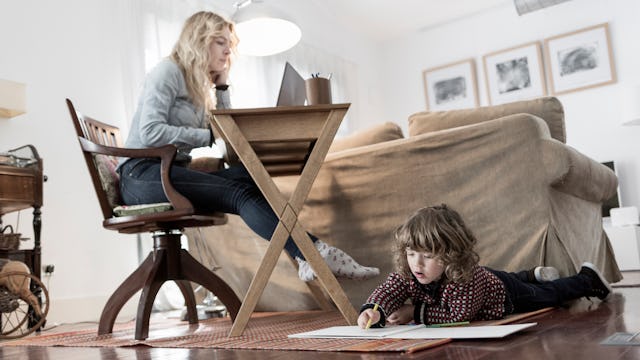I’m Not A Classic Nurturer, But I'm A Great Mom

I don’t dote on my kids. I don’t hover over their school projects, hot glue gun in hand to correct their sloppiness. I don’t pack them adorably arranged lunches or help them style their hair or make sure their clothes match (they almost never do).
We don’t snuggle very often—I get too hot and sweaty—and I never could co-sleep because, although the idea sounds absolutely beautiful, I can’t stand to be touched when I’m sleeping. The sound of a kid crying grates on my eardrums. I don’t like pretend play and I hate crafts. I’m impatient. I get “touched out” quickly and need a lot of personal space.
There are so many behaviors I assumed would come naturally to me once I became a mother that in reality didn’t come naturally to me at all. For a while, I forced myself. I did skin-to-skin contact like the books said to do. I spoke with a low, soothing voice. I sat on the floor with one kid or the other and pretended to care about Transformers or My Little Pony. I would literally cry with boredom—actual tears would squeeze out of the corners of my eyes and dribble down my face. My skin would crawl with the urge to get up and run, somewhere, anywhere else.
I’ve since stopped forcing myself. I couldn’t seem to shape myself into this image of the ever-patient natural nurturer, gladly giving my entire self up to motherhood. It didn’t come naturally, and when I did force it, instead of turning me into the doting mother I’d hoped to mold myself into, it only made me snippy and short-tempered.
And so, without any particular awareness of what I was doing, I began to parent in a way that felt more comfortable to me. I began leaving my kids to their own devices as I built my writing career and started exercising again, taking time for myself—at the expense of being an ever-present mother. They would come to me asking for a snack and I’d tell them to help themselves. They would ask me to play a game and I would tell them to find something to do on their own. I slept in while they got their own breakfast. I felt guilty about this, but I was tired. I just… couldn’t anymore.
And yet I know I’m a good mom. In fact, I would say I’m an even better mom now than I was before when I was bending over backwards trying to be the mom the books, the media, and the societal images told me I needed to be.
I still give lots of hugs and make sure my kids know they are infinitely cherished. I show up for the important moments, and I help them solve problems—but only when they get stuck after putting in the effort to try and do it on their own. I don’t immediately console when someone cries. Can they pick themselves up and dust themselves off? Can they get their own Band-Aid? Are they really hurt or can they work their emotions out on their own? Let me tell you about my 8-year-old’s puffed-out chest and proud grin after she suffers a scrape and then cleans and bandages it herself. And about my 12-year-old who can cook a full meal. They figured this stuff out on their own because I—not realizing what I was doing—got the hell out of their way.
I put distance between myself and my kids, and they expanded and filled the space I created. This has become a source of pride for me—how self-sufficient my kids are. It’s something I acknowledge in them every day and is a source of pride for them as well.
I wonder if, too often, nurturing and martyrdom entangle to the point of being synonymous. Maybe stepping back is its own form of nurturing.
Because my kids still know they can come to me. When they were littler, but when I had already begun to create this distance between us, I read somewhere that if your child puts their ear to your chest and listens to your heartbeat and breathing, it can stop a tantrum. So I used to do this. Despite my desire for personal space, and though it wasn’t something that naturally occurred to me, I did the head-on-the-chest thing, and it worked. I still do it sometimes if one of them need comforting. Lay your head on my chest.
And they do, and it still works. And, once they feel better, they go run and play by themselves.
This article was originally published on